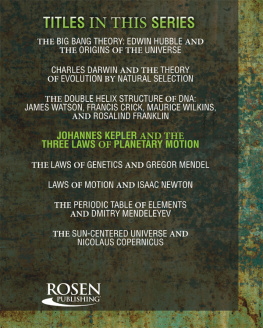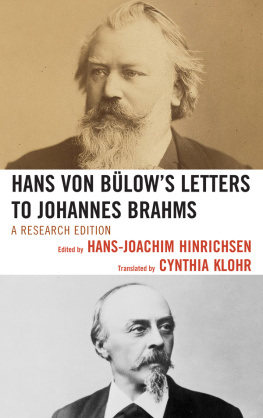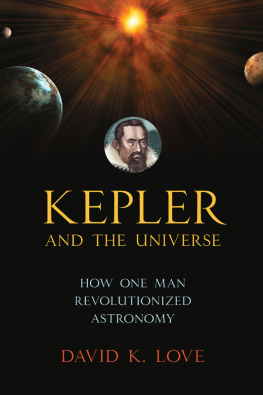SELECT BIBLIOGRAPHY
A. WORKS CONTAINING THE LATIN OR GERMAN ORIGINALS OF KEPLERS LETTERS:
Epistolae J. Keppleri et M. Berneggeri mutua, Strassburg, 1672.
M. G. Hansch, Joannis Kepleri aliorumque Epistolae mutuae, 1718.
Christian Frisch, Joannis Kepleri Opera Omnia, 8 volumes, Frankfurt a.M. und Erlangen, 18581871.
Johannes Kepler, Gesammelte Werke ed. by Max Caspar, Mnchen, 1938 ff. Only a few volumes of this new monumental edition have as yet appeared.
Johannes Kepler in seinen Briefen, ed. by Max Caspar und Walther von Dyck, 2 volumes, Mnchen und Berlin, 1930.
B. WORKS BY KEPLER MENTIONED IN THE PRESENT BIOGRAPHY
| 1595 | Calendarium und Prognosticum for the years 159199 (the text of this first |
| publication of Kepler is no longer accessible either in print or among his MSS). |
| 1596 | Prodromus Dissertationum Cosmographicarum continens Mysterium Cosmographicum (Harbinger of inquiries concerning the structure of the universe and containing the worldmystery). |
| 1604 | Astronomiae pars Optica (Optics in its relation to astronomy, which was later supplemented by his Dioptrice, 1611). |
| 1605 | Epistola de Solis Deliquio (on the eclipse of the sun of October 12, 1605). |
| 1606 | De Stella nova in pede Serpentarii (The new star in the foot of Serpentarius). |
| 1609 1609 | Astronomia Nova (The New Astronomy) Mercurius in Sole (Mercury in the Sun i.e. Mercurius in passing the Sun.) |
| 1610 | Dissertatio cum Nuncio Sidereo (Discussions of Galileos Star Herald). |
| 1610 | Tertius Interveniens (The Intervening Third, a German writing on Astrology addressed to Philipp Feselius). |
| 1610 | Narratio de observatis a se quatuor Jovis Satellitibus erronibus (Treatise on the Satellites of Jupiter). |
| 1614 | Ad epistolam Sethi Calvisii Chronologi Responsio (Answer to a letter of Calvisius). |
| 1614 | De vero anno quo Aeternus Dei Filius humanam naturam ... assumpsit (On the year in which the eternal son of God took on human nature). |
| 1615 | Eclogae Chronicae (Chronological questions). |
| 1615 | Nova stereometria doliorum vinariorum (New stereometry of wine barrels; sterreichisches Weinvisierbchlein) . |
| 1618, 20, 21 Epitome astronomiae Copernicanae, in three parts (Handbook of Copernican Astronomy). |
| 1618 1619 | Ephemerides (Astronomical Year Book). Harmonice Mundi (The Worldharmony). |
| 1619 | De cometis libelli tres (Three pamphlets on the comets). |
| 1621 | 2nd edition of the Mysterium Cosmographicum. |
| 1624 | Chilias logarithmorum (On Logarithms). |
| 1625 | Hyperaspistes by Tycho Brahe (revised and published by Kepler). |
| 1627 | Tabulae Rudolphinae (Rudolphine Tables). |
| 1629 1629 | Supplement to the Rudolphine Tables. Admonitio ad astronomos (Admonition to the astronomers). |
| 1630 | Epistola ad Terrentium (Letter to Terrentius). |
| 1634 | Somnium seu opus posthumum. De astronomia lunari (Dream on the astronomy of the moon). |
C. LITERATURE ON KEPLER
L. L. C. von Breitschwert, Johann Keplers Leben und Wirken, Stuttgart, 1831.
Sigmund Gnther, Kepler und Galilei, Berlin, 1896.
Paul Rossnagel, Johannes Keplers Weltbild und Erdenwandel, Leipzig, 1930.
Hans Schimank, Epochen der Naturforschung, Berlin, 1930.
D. BIBLIOGRAPHICAL LITERATURE
Max Caspar, Bibliographia Kepleriana, Mnchen, 1936.
YOUTH AND YEARS OF APPRENTICESHIP
How little does the educated man of our time know about Johannes Kepler! Generally, even astronomers know only that Kepler, the German, was, probably, the most highly gifted among the four great founders of modern physics and astronomythe heir and executor of the ideas of Copernicus, the Pole, the friend and collaborator of the great Italian Galileo Galilei and the most important of the forerunners of Isaac Newton, the first systematizer of modern science.
It is, however, hardly common knowledge that Kepler was not only one of the greatest scientific geniuses of all times, but also something of a poet and one of the most lovable and moving personalities of modern history. The nobility and superiority of character with which he endured a life full of hardship is still a shining example of inner spiritual strength in the midst of outward failure.
Max Brod, the fine poet, friend and editor of Franz Kafka, has written an exquisite novel dealing with the youth of Kepler and his relation to his teacher and collaborator, Tycho Brahe, whose astronomical teaching he was destined to outshine. The novel has been translated into English under the title The Redemption of Tycho Brahe. It gives a very valuable insight into the thoughts and feelings of the young Kepler.
But nowhere is full justice done to the mans bitter, stirring, lifelong struggle with a grim fate, and the striking inner victories of his gay and warmhearted nature over all the darkness of the circumstances that surrounded him. This fight for truth and personal integrity did not end until death came to him in his sixtieth year of life.
Everyone takes it for granted today that the paradoxical theory of Copernicus is scientifically superior to the common sense belief in the movements of the sun around the earth. We are no longer aware of how heretic, how absurd and how dangerous the Copernican theory was thought to be in the sixteenth and seventeenth centuries. We react as narrow-mindedly and unimaginatively as a daughter who found it too difficult to get the right marital partner while she believed it only too simple for her mother to marry her fatherso well known to the mother and even the daughter herself.
The strange Copernican theory of the movements of the earth around the sun which received its most vital verification in Keplers life work was in his day generally considered as fantastic nonsense, and as wanton, completely unjustifiable contempt of Biblical teaching and common sense. Kepler had to spend the energies of his genius in an epic struggle for a most paradoxical and difficult truth; and although the subject matter may change from century to century, the life experience of the boldest discoverers of truth, unfortunately, even today, is too often extremely similar to that of Kepler.
Sir David Brewster, the eminent Scottish physicist, rightly counted Kepler among The great Martyrs of Science; himself a great explorer of nature, has pertinently pointed to that almost unparalleled combination of bold imaginative power with mathematical profoundness which characterizes the originality of Keplers mind.
Nor was Kepler himself unaware of the greatness of his achievements. In the preface of the fifth chapter of his Cosmic Harmonies Kepler concludes his humble apologies for the revolutionary and allegedly irreligious character in his teaching with the following proud and exalted sentence: Eighteen months ago the first dawn rose for me, three months ago the bright day, and a few days ago the full sun of a most wonderful vision; now nothing can keep me back. I let myself go in divine rage. I defy the mortals with scorn by an open confession. I have stolen the golden vessels of the Egyptians to make out of them a holy tabernacle for my God, far away from the frontiers of Egypt. If you pardon me, I will be delighted; if you are angry with me, I shall bear it. Well then, the die is cast, I am writing a book for my contemporaries orit does not matterfor posterity. It may be that my book will have to wait for its readers for a hundred years. Has not God himself waited for six thousand years for some one to contemplate his work with understanding?









